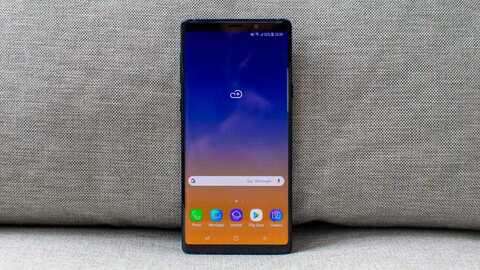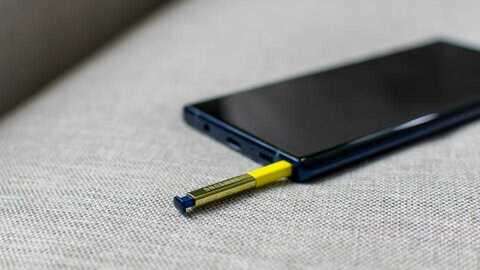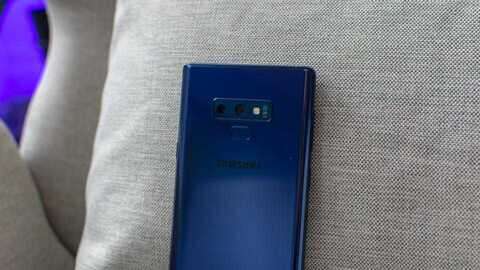Samsung Galaxy Note 9 vs Galaxy Note 8: Clash of the titans
The Samsung Galaxy Note 9 debuted with aplomb on 9 August at Samsung’s Unpacked event in New York. The big unveiling followed months of speculation as to what the South Korean giant’s upcoming phablet was going to look, feel and perform like. Now the Note 9 has seen the light of day, we've got a clear picture of what it's like.
READ NEXT: All you need to know about Samsung’s Galaxy Note 9
Now comes the inevitable time when we pit the Galaxy Note 9 against its predecessor, last year’s Galaxy Note 8, to find out which is better, and work out what’s changed.
Should you snap up the Galaxy Note 8, or perhaps wait for the Note 9 to be unveiled? Read on to find out the crucial differences between the two phablets, and decide for yourself if you think the Note 9 is a must-buy when its commercial release – 24 August – rolls around.
Samsung Galaxy Note 9 vs Galaxy Note 8: Design
Okay, so size-wise, the Galaxy Note 8 wasn’t a particularly pocket-friendly phone, measuring up at 162.5 x 74.8 x 8.6mm and weighing 196g.
And while the Note 9 sees those dimensions shaved down a tad – it measures up at 162 x 76 x 9mm – that's not a massive depletion in size, so expect those pockets to keep on bursting at the seams.
It also weighs around nine grams more than the Note 8, coming in at 205g, although we can't imagine this being a particular deterrent.
In terms of general aesthetic, there's no huge gulf in physical appearance between the Galaxy Note 8 and Note 9. Indeed, if you look back to the design of the Galaxy S8 and Galaxy S9 , the difference is negligible, and certainly not significant enough to warrant an upgrade if looks are at the top of your smartphone-buying agenda.

Indeed, in our full review , we reckon that the Galaxy Note 9 serves as a timely reminder that smartphone design is plateauing.
Samsung has, however, changed up the design of the Galaxy Note 9 in an easy and aesthetic way, unveiling the Note 9 in three distinctive hues; there's black (obviously), a serene, deep blue, and a lavender/violet colour – the most intriguing of the three. It's not for everyone, but it'll be sure to turn a few heads.
Samsung Galaxy Note 9 vs Galaxy Note 8: Specs
As for display, the Note 9's harks back to the Note 8, with an AMOLED edge-to-edge screen, complete with those lovely curved edges and bordered by super-slim bezels. The Note 9’s display also supports the HDR10 standard.
There is, however, a slight difference in screen size; the Note 9's 1,440 x 2,960 resolution panel measures 6.38in from corner to corner, up marginally from the 6.3in screen sported by the Note 8.
READ NEXT: The best smartphones you can buy
As for the innards, upgrades are minor and predictable, but they’re upgrades nonetheless. While the Note 8 either boasted Qualcomm’s then-flagship Snapdragon 835 chipset or Samsung's own Exynos 8895 equivalent (if you live outside of the US), the Note 9 has launched with the updated Snapdragon 845 or Exynos 9810.
Again, history is repeating itself; the Note 8’s 6GB of RAM has cropped up again in the Note 9, although we now have just two storage options: 128GB or a whopping 512GB.
So, everything has been rather unsurprising so far, but not, supposedly, when it comes to the Note 9’s battery. The phablet has launched with a whopping 4,000mAh battery. When you take the Note 8’s 3,330mAh battery into account, this represents a rather sizeable upgrade, and the phone’s stamina may be much improved as a result.
Samsung Galaxy Note 9 vs Galaxy Note 8: Features
One arena in which the Note 9 has seen a notable markup from the Note 8 is with the S-Pen stylus. The accompanying device slots right into the bottom of the phone, comes equipped with Bluetooth functionality, and sports a button on the side of the pen which can be pressed to trigger certain actions, like snapping selfies or presenting slideshow presentations. Pretty James Bond, if you ask us...

Unlike previous-generation S-Pens, the Note 9’s smartphone stylus will also be available separately.
READ NEXT: Best budget smartphones
Aside from that, a key focus for the Galaxy Note 9 lies in its dual rear cameras. Samsung has acknowledged in the past that the appeal of the Note range lies in its camera, and the Note 9 is no exception to this rule.
The back of the Note 9 sees a horizontal dual-camera arrangement complete with a fingerprint reader ensconced underneath. One of the cameras is a wide-angle 12-megapixel f/1.5 camera, while the other sports an f/2.4 telephoto lens with 2x optical zoom. Not much difference here from the Note 8 then, whose dual-sensor arrangement came equipped with a wide-angle 12-megapixel f/1.7 camera, while the other has an f/2.4 telephoto lens with 2x optical zoom.
Both of the Note 9's cameras come fully equipped with optical image stabilisation (OIS) for clear, stable snaps.
Out of these snazzy camera specs, the most exciting addition is the f/1.5 aperture that's substantially wider than that of the Samsung Galaxy Note 8. This does a world of good, ensuring that shots are bright and details are crisply captured. What's more, there's no manual involvement in getting this to work; the camera will automatically widen the aperture once the lighting conditions drop below 100 lux. It also narrows to f/2.4 when the scene you're snapping is particularly bright.
The above is something we've seen already, though not on the Note 8, but the Galaxy S9. And we're certainly not complaining about this little upgrade...

So yes, the Note 9 doesn't mark an unprecedented deviation from its predecessor spec-wise, but then again, why would it? We loved the Note 8 – giving it four stars – and there's a few key updates to the Note 9 that make for some exciting exploration, particularly on the camera front.
Samsung Galaxy Note 9 vs Galaxy Note 8: Price
In short, the Galaxy Note 9 is an appealing smartphone, there's no two ways about it. However, before you start rubbing your mitts together in anticipation of the 24 August launch date, there's one almighty caveat to the Note 9 – the price...
Samsung’s Galaxy Note 8 retailed at a hefty £869, and can currently be picked up for roughly £600 . Meanwhile, the Note 9 is, predictably, even less palatable to those on a budget; the 128GB version can be snapped up for a cool £899 (lots, sure, but only a £30 increase from last year's handset), but the 512GB option will set users back a phenomenal £1,099. Those quadruple figures make the iPhone X look positively cheap (not really, but you get the message).

So yes, it's an excellent smartphone, one with some notable step ups from its predecessor, particularly the camera ability and battery life (and also, the jazzy new colours, if you're into your aesthetics). However, as Samsung's first four-figured smartphone, we're left thinking that there are cheaper laptops out there, that might just have more functionality for less dosh.
Meanwhile, with the Note 8 now retailing at under the £600 bar, it's looking like a more feasible and still excellent option for Samsung phableteers on a budget.